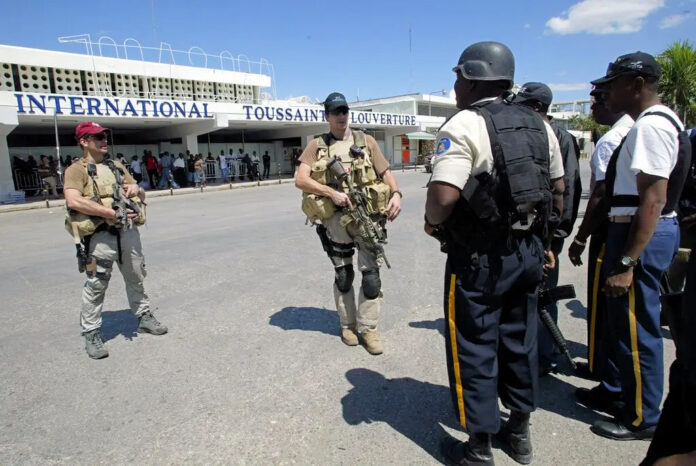
The Canadian military doesn’t want the U.S. Empire’s surplus missions. They want to play with the big boys; they want “serious” deployments. Problem is, those running the empire want them to go to Haiti.
In an article on why Anita Anand was removed as defence minister in the recent cabinet shuffle Ottawa Citizen reporter David Pugliese confirmed that the Canadian military put the final dagger in the coffin of Washington’s bid for Canada to lead a mission to Haiti. With the Prime Minister’s Office willing to continue discussing the subject, Chief of the Defence Staff Wayne Eyre told Reuters the military didn’t have the capacity for a Haiti mission days before President Joe Biden was to press the matter during a March visit to Ottawa.
According to Pugliese, “defense insiders privately say the Americans were furious their request had been turned down.” (Anand apparently sided with the military leadership on Haiti and in pushing a big boost in “defense” spending to the chagrin of the Prime Minister’s Office.)
On its face, Eyre’s move seems to contradict the notion that the military is one of Canada’s most pro-U.S. institutions, but it doesn’t really. Resistance to the Haiti mission reflects the institution’s power as well as its complicated relationship to U.S. imperialism, peacekeeping, and the Caribbean nation.
While close to their U.S. counterparts, the Canadian military doesn’t want Washington’s secondary missions. It wants aggressive, flashier, NATO (or China-focused) deployments. Tension within and between the military and foreign policy apparatus over UN versus NATO deployments are long-standing. The Canadian military has participated in crassly imperialistic, U.S.-instigated UN missions such as helping to assassinate Patrice Lumumba and overthrow Jean-Bertrand Aristide. While more benign, Canada’s most famous peacekeeping mission to Egypt in 1956 was instigated by Washington (to paper over divisions within NATO over the British, French, and Israeli invasion). But the Canadian military generally prefers hard power missions.
In the 2000s, the military saw Afghanistan as a way to assert its warfighting bona fides. As Chief of the Defense Staff Rick Hillier infamously proclaimed: “We are going to Afghanistan to actually take down the folks that are trying to blow up men and women … we’re not the public service of Canada, we’re not just another department. We are the Canadian Forces, and our job is to be able to kill people.”
the Canadian military wants aggressive, flashier, NATO (or China-focused) deployments.
In other words, while the military wants “glorious” war fighting missions, Ottawa and Washington want a force that also fulfills other functions, such as policing “less important” parts of the empire.
A year after Ottawa formally declined to join the George W. Bush administration’s “coalition of the willing” – Canadian troops actually participated in the 2003 invasion of Iraq in many ways – 500 Canadians invaded Haiti to help overthrow Aristide and thousands of other elected officials. Former foreign affairs minister Bill Graham explained: “Foreign Affairs view was there is a limit to how much we can constantly say no to the political masters in Washington. All we had was Afghanistan to wave. On every other file we were offside. Eventually we came on side on Haiti, so we got another arrow in our quiver.”
While U.S. and French troops withdrew when the United Nations Stabilization Mission in Haiti (MINUSTAH) was established three months later, the Canadian soldiers stayed for six months. Subsequently, Canadians took up positions of authority within MINUSTAH and Canada led the 1500-person policing part of the UN force.
Haiti has repeatedly been a site of U.S.-Canadian imperial exchange. In the mid-1990s Washington pressed Ottawa to form the backbone of the UN force mandated to professionalize Haiti’s military and create a separate police force. At the 1996 NATO summit Prime Minister Jean Chrétien was caught on an open microphone saying, “he [U.S. President Bill Clinton] goes to Haiti with soldiers. The next year, Congress doesn’t allow him to go back. So he phones me. Okay, I send my soldiers, and then afterward I ask for something in return.”
One must be careful when refusing a request from the Godfather. But, even though it hasn’t announced troops, the Trudeau government has assisted Washington’s push for intervention in Haiti. Ottawa has pressed Caribbean countries to intervene, prompting commitments from Jamaica and the Bahamas. Recently, Ottawa has sought to woo Paul Kagame to deploy Rwandan forces, and Kenya announced it would send 1,000 police to lead a Multi-National Force. Ottawa has worked closely with UN Secretary-General António Guterres on Haiti. In a 12-page letter to the Security Council released Aug. 15, António Guterres called for a multinational force comprising “police special forces and military support units” to combat gangs.
As Haitian-American professor Jemima Pierre highlighted on Twitter “Has any other country been invaded due a gang problem?” Some 50 Haitian groups recently called on the African Union to oppose foreign intervention. Many have also appealed to veto-wielding Russia and China to oppose a Security Council resolution approving a UN mission.
While a major deployment seems unlikely, it’s still possible a new defense minister will dispatch a small contingent of Canadians to Haiti. It should be opposed.
This article was first published on Yves Engler’s website.










[…] Defence’s refusal to take a leading military role in another occupation of Haiti, Yves Engler comments: “While close to their US counterparts, the Canadian military doesn’t want Washington’s […]